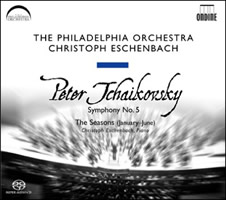Post by akiralx April 12, 2006 (1 of 35)
|
|
I've heard that this one *is* pretty slow, but this review seems to put another take on it:
http://www.classicstoday.com/review.asp?ReviewNum=9917
Anyone heard it?
I'm a bit of a sucker of Tchaik 5, the Kobayashi Czech PO one on Exton is winging its way to me now from Japan - I ordered it after hearing his sensational Mahler 3.
|
|
|
Post by seth April 12, 2006 (2 of 35)
|
|
akiralx said:
I've heard that this one *is* pretty slow, but this review seems to put another take on it:
http://www.classicstoday.com/review.asp?ReviewNum=9917
Like Victor Carr said, there are sharply contrasting tempo changes; sometimes it's slow, other times it's fast.
On the whole, it's an individualistic micro-managed performance that some people will love while leaving others to gladly stick with their classic recordings. Also be sure to factor in Philadelphia's superb playing.
|
|
|
Post by wehecht April 12, 2006 (3 of 35)
|
|
I have listened to this recording twice in four days but am not yet sure enough of what I think about it to submit a review. As the linked review says the sonic attributes of the recording are absolutely first class, as is the orchestra's execution. Both reflect the high standards we regularly enjoy here in Philadelphia. But, and this is why I remain uncertain about the performance aspect of the disc, we are also regularly treated to Maestro Eschenbach's idiosyncratic tempo choices, and this Tchaikovsky fifth interpretation is no exception. The unusual length of this performance doesn't result from uniformly slowish tempos, but from a combination of normal to slightly fast passages and others that are slow to extemely slow. There is great beauty here, and had I attended this performance I would have been very enthusiastic in my applause, but I'm not sure how well this will withstand repeated listening over time. When my mind is made up on that issue I'll either add another comment here or submit a review.
|
|
|
Post by Peter April 12, 2006 (4 of 35)
|
|
seth said:
....On the whole, it's an individualistic micro-managed performance.....
What does micro-managed mean? I remember one of Rattle's recordings described as such, too, but not where I read it.
(I have yet to hear either of his Ondine recordings, which have received widely differing reviews, and, BTW there's a new Ondine Eschenbach disc of Roussel, CD only, a pity.)
|
|
|
Post by Edvin April 12, 2006 (5 of 35)
|
|
Peter said:
What does micro-managed mean? I remember one of Rattle's recordings described as such, too, but not where I read it.
It is where the conductor is not satisfied until he has rehearsed and over-rehearsed every phrase and bar, every dynamic and all the minor details. It is when you as a listener feel that the conductor is more important than the composer because of the former´s need for control of every minute detail in the score. The opposite of spontaneous music making.
|
|
|
Post by seth April 12, 2006 (6 of 35)
|
|
Peter said:
What does micro-managed mean? I remember one of Rattle's recordings described as such, too, but not where I read it.
It means that the conductor has a comment for every note in the score, regardless if it is warranted, and you can hear each one of his gestures. Both Eschenbach and Rattle seem to have a compulsion to throw in as many 'interpretational' touches as possible.
|
|
|
Post by seth April 12, 2006 (7 of 35)
|
|
Edvin said:
It is where the conductor is not satisfied until he has rehearsed and over-rehearsed every phrase and bar, every dynamic and all the minor details. It is when you as a listener feel that the conductor is more important than the composer because of the former´s need for control of every minute detail in the score. The opposite of spontaneous music making.
The Thursday night concerts typically suffer from being over-rehearsed. The Orchestra sounds like they're just going through the motions and some of Eschenbach's touches come off as forced, with the Orchestra being noticeably uncomfortable playing them. By Saturday night the playing sounds more spontaneous and some of Eschenbach's touches have been nixed. Apparently with the first two releases, the editing approach has been using a single night in its entirety and fixing mistakes with the two other nights.
|
|
|
Post by Peter April 12, 2006 (8 of 35)
|
|
seth said:
It means that the conductor has a comment for every note in the score, regardless if it is warranted, and you can hear each one of his gestures. Both Eschenbach and Rattle seem to have a compulsion to throw in as many 'interpretational' touches as possible.
Thanks. Understood. I only know Eschenbach as a pianist, so am keen to hear these two Philadelphia recordings, but couldn't justify buying this one having just ordered Gatti's! (Nor can I comment much on Rattle; I have a very few of his recordings and found they didn't hit the spot, and I'm not sure why this is.)
|
|
|
Post by Peter April 12, 2006 (9 of 35)
|
|
Edvin said:
It is where the conductor is not satisfied until he has rehearsed and over-rehearsed every phrase and bar, every dynamic and all the minor details. It is when you as a listener feel that the conductor is more important than the composer because of the former´s need for control of every minute detail in the score. The opposite of spontaneous music making.
Thanks, Edvin. Munch, one of my preferred conductors from the past, couldn't be accused of that!
There are a couple of Berlioz overtures from the late 1940s here for download:
http://homepages.ipact.nl/~otterhouse/
Le Corsaire definitely isn't micro-managed. Do have a listen. I think it's only available today. (Apologies - off topic)
|
|
|
Post by Edvin April 12, 2006 (10 of 35)
|
|
Thank you Piotr,
I listened to an old favorite this evening and was again absolutely taken by the music making, the Daphnis from Munch, the early one. You just cannot turn this off, even if you have other things to do. I still haven´t got his Berlioz Requiem.
Thanks for the tip, shall check it out.
|
|

